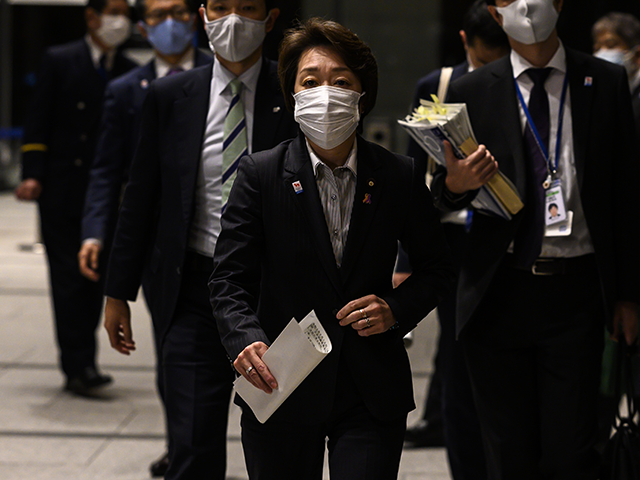Japan’s Liberal Democratic Party (LDP), the ruling conservative party, announced on Thursday it would consider allowing women to attend top-level party meetings, but not allow them to talk.
The announcement appears to be a gesture towards placating women’s rights advocates in the country amid a scandal that erupted after the former head of the committee planning the 2020 Tokyo Summer Olympics, Mori Yoshiro, complained that adding more women to Olympic committees would make meetings last too long because of women’s alleged tendencies to speak for too long, extending the length of meetings needlessly.
Mori, 83, has since resigned and been replaced by a woman, Olympic medalist Hashimoto Seiko.
The incident has nonetheless triggered ongoing outrage towards corporate culture in Japan, which has tended for decades to treat women extremely harshly. Women enjoy less career mobility than men and are typically expected to drop out of the workforce once they choose to start a family, leading to some companies pressuring women to have abortions if they wish to keep their jobs. Many women are also expected not to pursue romantic relationships or build their own families when older family members need tending to, resulting in a drop in marriages and alarming birth rates that Tokyo has yet to reverse.
The secretary-general of the LDP, Nikai Toshihiro, also an octogenarian, stated on Thursday that he believed it was “important for them [women] to fully understand what sort of things are being discussed” in high-level party meetings, making it necessary to have some female members of the party attend them. He refused to discuss the potential of women being allowed active participation in those meetings, though unlike Mori he refrained from claiming the reason to be that women simply talk too much if allowed.
Nikai did note that a silent, written format would be in place for women to submit comments, but did not note if those comments would be read at the meeting or simply allowed to be placed on the record.
The move, Asahi Shimbun reported, was in part a response to former defense minister Inada Tomomi, a woman, urging the LDP to allow women in Japan’s Diet, the national legislature, to attend party meetings.
“According to LDP sources, the party is considering letting female lawmakers attend General Council meetings, where the LDP’s policies are formally adopted, and the extraordinary meetings of the Board, where party executives share information,” Asahi reported.
The discussion within the ruling party follows several weeks of controversy surrounding Mori’s comments about women. Mori, speaking before the Japan Olympic Committee Council on February 3, claimed women feel outsized pressure to contribute to meetings and become “competitive,” resulting in more talking than necessary.
“When someone raises his or her hand and speaks, they probably think they should speak, too. That is why they all end up making comments,” Mori lamented.
He attempted to praise the women on the Olympic Committee by stating that, while they were allowed to attend meetings, “they all know how to behave.”
Mori apologized and resigned from his position, replaced on Thursday by Hashimoto, who emphasized her experience as an Olympian over her status as a woman in her remarks thanking the committee for the top position.
“As a former athlete myself, I believe my mission is to bring about an Olympics that places priority on safety for all participants and to change the mood in society so all athletes can step on their dream stage without any doubts in their mind,” Hashimoto said. “I will seek to accomplish this mission while clearly taking the stance of ‘athletes first.’”
Prior to taking the position at the Olympic Committee, Hashimoto was the Japanese government minister in charge of Olympic affairs.
Japan canceled the Tokyo 2020 Olympics in response to the Chinese coronavirus pandemic, which greatly limited the ability of most in the world to travel, and is planning on hosting the games in the summer of 2021.
Gender disparities in the workplace are considered one of a long list of issues affecting Japan’s dwindling population, which appears to have declined dramatically in 2020 amid the Chinese coronavirus pandemic. Japanese Health Ministry statistics released in February showed a decline in the nation’s population of 420,000, a record in the history of the country and the twelfth year in a row that the population fell rather than grew.
“The natural rate of decline — or the difference between births and deaths — was about on par with 2019 during the first seven months of the year,” Japan’s Nikkei reported. “But net foreign arrivals to the country tumbled more than 40% over that period to 115,000 amid entry restrictions aimed at curbing the spread of the virus.”
The outlet noted that preliminary birth rate numbers showed a 5.1-percent drop in the number of births between October 2019 and October 2020. Japan’s birth rate has been under 1 million births per year since 2016 and dropping every year.
Tokyo has attempted to encourage couples to have more children through several programs, including a proposal in 2016 to offer funding for women to freeze their eggs to use in the future should they not wish to drop out of the workforce years. More recently, Prime Minister Suga Yoshihide announced a $19-million government investment into “programs to help residents find love,” which may include the use of artificial intelligence to help single people find partners. At the time of the announcement, half of Japan’s prefectures offered some form of government-organized matchmaking to promote births.

COMMENTS
Please let us know if you're having issues with commenting.